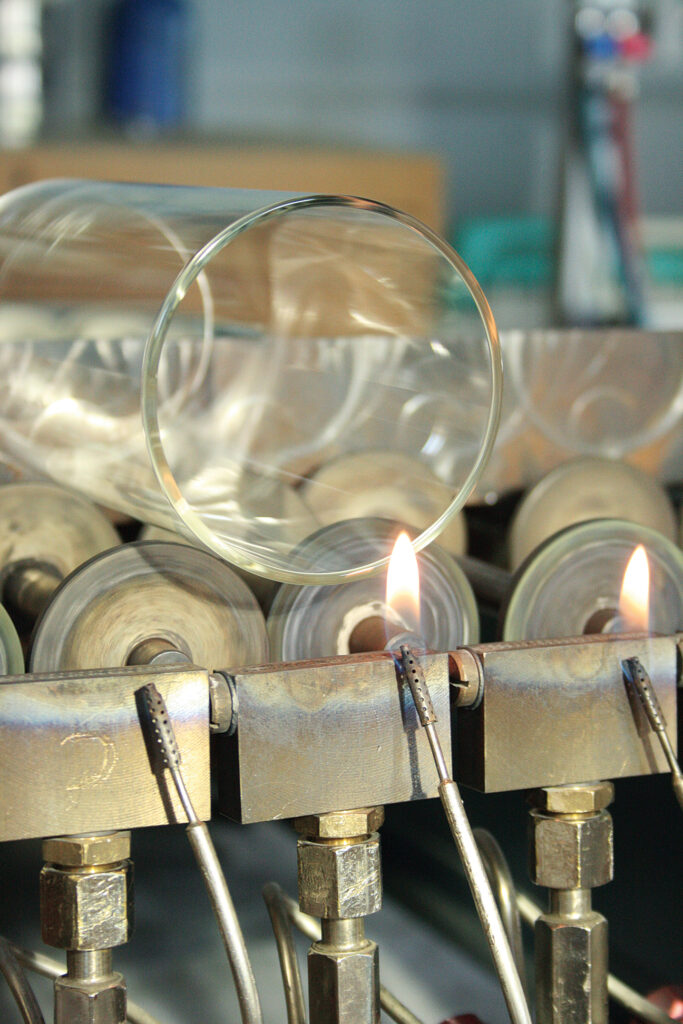In the realm of laboratory equipment and industrial applications, the choice of materials is paramount. Among the various options available, quartz glass stands out for its remarkable physical and optical properties.
One crucial aspect that sets quartz glass apart is its exceptional melting point, which significantly influences its suitability for diverse applications.
Let’s delve into the melting point of quartz glass and understand how it compares to traditional glass compositions.
Quartz Glass Possesses Unique Properties
Quartz glass, also known as fused quartz or silica glass, is composed primarily of silicon dioxide (SiO2) molecules arranged in a crystalline structure.
Unlike traditional glass formulations, which may contain additives and impurities, quartz glass is renowned for its high purity and crystal-clear transparency.
This purity, combined with its unique atomic structure, gives quartz glass its exceptional mechanical, thermal, and optical properties.
Understanding the Melting Point of Quartz Glass
One of the most distinctive characteristics of quartz glass is its remarkably high melting point. Quartz glass typically has a melting point of around 1650°C (3000°F), making it significantly higher than most conventional glass compositions.
This elevated melting point is attributed to the strong chemical bonds between silicon and oxygen atoms in the crystalline lattice structure of quartz.
How Does The Melting Point of Quartz Glass Compare to Traditional Glass?
Different types of glass compositions vary in their thermal properties. In contrast to quartz glass, traditional glass compositions have lower melting points and exhibit broader melting ranges.
This difference in melting behavior arises from variations in chemical composition and molecular structure between quartz glass and traditional glass formulations.
- Borosilicate Glass: Commonly used in laboratory glassware and industrial applications, borosilicate glass typically melts at temperatures ranging from 825 °C to 1,260 °C (1,517 °F to 2,300 °F). Although borosilicate glass offers good thermal shock resistance and chemical durability, its melting point is lower compared to quartz glass.
- Soda-Lime Glass: Soda-lime glass, the most common type of glass used in everyday items such as windows, bottles, and tableware, has a melting point ranging from 600 °C to 900 °C (1,112 °F to 1,652 °F). While soda-lime glass is cost-effective and versatile, its lower melting point limits its suitability for high-temperature applications.
- Lead Glass: Lead glass, also known as crystal glass, contains lead oxide, which imparts exceptional optical properties such as brilliance and clarity. However, lead glass has a relatively low melting point compared to quartz glass, typically around 800 °C to 900 °C (1,472 °F to 1,652 °F).
The melting point temperature difference between quartz glass and borosilicate glass is significant, as borosilicate glass has a significantly lower melting point. That makes quartz glass a preferred choice for many application areas.
Quartz glass offers exceptional properties in demanding applications requiring exceptional thermal stability, chemical resistance, optical clarity, and thermal shock resistance.
Implications for Laboratory Equipment and Industrial Applications
In industrial and laboratory settings, where processes involve high-temperature operations, quartz glass components ensure reliability and longevity, even in harsh operating environments.
Applications in High-Temperature Environments
The applications of quartz glass spans across a vast array of industries, each benefiting from its unique combination of properties.
From semiconductor manufacturing to aerospace engineering, and from medical diagnostics to consumer electronics, quartz glass continues to drive innovation and progress across diverse sectors.
Precision Optics and Laser Technology
In the realm of optics and photonics, quartz glass’s high melting point enables the fabrication of precision optical components for lasers, spectroscopy, and imaging systems.
Its thermal stability and optical clarity make it ideal for lenses, prisms, and windows used in high-power laser applications, where traditional glass would distort or degrade under intense heat.
Laboratory Equipment and Scientific Instruments
Quartz glass finds extensive use in laboratory equipment and scientific instruments, where precise measurements and extreme conditions are common.
From crucibles and reaction vessels to thermocouples and sample holders, quartz glass components ensure reliable performance in analytical chemistry, materials science, and biotechnology applications.
High-Purity Manufacturing Processes
In manufacturing processes requiring strict purity standards, such as semiconductor fabrication and pharmaceutical production, quartz glass’s high melting point and inert nature make it an ideal material choice.
Its resistance to chemical corrosion and low contamination levels ensure the integrity of critical processes, contributing to product quality and yield.
Optical and Mechanical Properties
Beyond its impressive thermal characteristics, quartz glass boasts exceptional optical transparency and mechanical strength.
Its low coefficient of thermal expansion minimizes the risk of cracking or fracturing when subjected to rapid temperature changes, while its high dielectric constant makes it ideal for applications involving electromagnetic radiation, such as ultraviolet (UV) light transmission and laser optics.
Elevate Your Applications with Quartz Glass
In summary, the melting point of quartz glass is a defining characteristic that underscores its suitability for a wide range of laboratories and industrial applications. With its exceptionally high melting point, superior thermal stability, and outstanding optical properties, quartz glass stands as a versatile and reliable material choice for demanding environments.
Whether you’re looking to buy quartz glass for your laboratory equipment, industrial components, or specialized optics, Quartz Solutions offers a comprehensive range of high-quality quartz glass products tailored to your specific requirements.
With our commitment to excellence and dedication to customer satisfaction, we ensure that you receive reliable, high-performance solutions for your application needs. Explore our selection of quartz glass products today and experience the unparalleled quality and performance first-hand.
Invest in quartz glass for your application and elevate your operations to new heights of precision and reliability.

